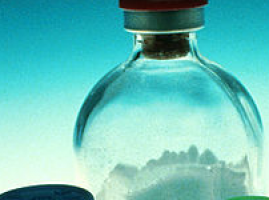
Mayo Clinic scientists have identified a specific protein implicated in drug resistance, as well as a possible therapeutic tool.
Their work appears in the EMBO Journal.
The team led by Haojie Huang, Ph.D., a Mayo Clinic tumour biologist within Mayo Clinic's Center for Biomedical Discovery identified the role of FOXO1 in chemotherapy resistance.
They also identified a potential therapeutic tool by engineering a peptide, which is a short segment of amino acids.
The authors examined the serine/threonine kinase AKT.
AKT's actions generally help cells survive, but when it goes awry this kinase plays a central role in many types of cancer.
Drugs that shut down AKT have great therapeutic promise, but, because of the complexity inherent in cellular communication, those therapies themselves instead may allow cancer to survive.
They found that taxanes prevent a protein called FOXO1 from migrating out of the cell's nucleus.
When FOXO1 stays put in the nucleus, another protein, ERK, becomes inappropriately active and kicks off signals that help cancer survive and develop resistance.
"This is why, despite great therapeutic promise, none of the AKT inhibitors have been approved by the Food and Drug Administration for anticancer use in clinic," explains Dr. Huang.
But, when FOXO1 does migrate out of the nucleus, it attaches to a scaffolding protein called IQGAP1.
That binding action blocks the activation ERK and prevents chemotherapy resistance.
"We also found that cotreatment with a taxane and a small FOXO1-derived peptide inhibitor blocks ERK activation and tumour growth," says Dr. Huang. "Uncovering this new and important mechanism of drug resistance may, one day, allow us to develop new therapeutics to overcome the resistance to taxane and AKT inhibitory medicines in cancers which harbour genetic lesions leading to hyper-activation of AKT."
This engineered peptide inhibitor has been patented by Mayo Clinic Ventures, the commercialization arm of Mayo Clinic.
Source: Mayo Clinic
The World Cancer Declaration recognises that to make major reductions in premature deaths, innovative education and training opportunities for healthcare workers in all disciplines of cancer control need to improve significantly.
ecancer plays a critical part in improving access to education for medical professionals.
Every day we help doctors, nurses, patients and their advocates to further their knowledge and improve the quality of care. Please make a donation to support our ongoing work.
Thank you for your support.